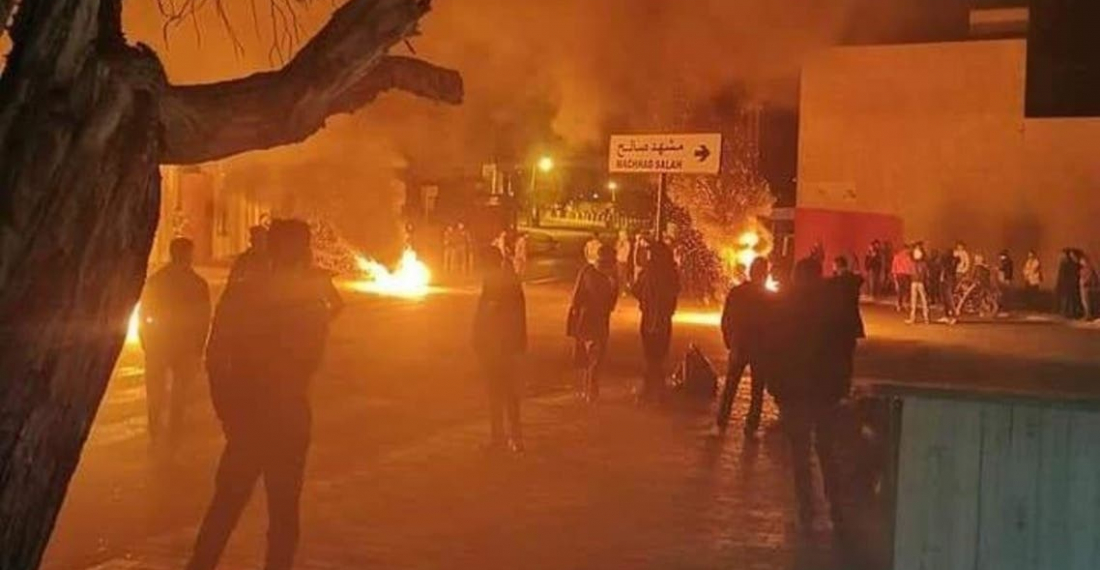Young people in Tunisia continue to demonstrate against unjust living conditions. Earlier protests were met with strong police resistance leading to several arrests and injuries. Estimates indicate more than 1000 have been arrested in recent protests.
On Thursday evening, demonstrations stood in front of the military barracks in the governorate of Tataouine, south of Tunis, to protest against the intervention of the army to prevent them from closing a gas station for collecting and pumping oil in the El-Kamour region in the desert in the far south of the country.
The army did not allow the protesters to reach the oil station and confiscated their cars which further angered the protestors as they retreated to the city centre.
Protests are generally believed to be well-organised. The "Coordination of El-Kamour Sit-in", a group that led the protest in Tataouine, said that the escalating tensions are due to the "lack of seriousness of the government" in implementing decisions and its adoption of the policy of procrastination in implementing the agreement signed on November 2020, which provided for the creation of jobs for the unemployed and plans for the development of the district.
On Saturday, protestors in the capital, Tunis, held a rally to mark the anniversary of the killing of secular activist and lawyer Chokri Belaid. The protestors defied a police lockdown that blocked roads in a large area of the capital.
Samir Cheffi, a senior Tunisian General Labour Union (UGTT) official, said the protest was needed to protect liberties. “Today is a cry of alarm to defend the revolution, to protect freedoms under threat,” he said.
So many riot police in back blocking path to Interior Ministry. Horrifying stories of torture of detainees in recent days coming out on social media & HR groups reports pic.twitter.com/a7t8fDzcB6
— Fadil Aliriza (@FadilAliriza) February 6, 2021
Ten years after Tunisia’s revolution, Tunisia is riddled with mistrust on various fronts. On one hand, labour unions and security forces accuse each other of exploiting their privileges and on the other hand, the country's political establishment is mired in squabbling between the president, prime minister and the parliament as the economy stagnates.
The most recent development was a ministerial reshuffle which was proposed by the Prime Minister Hichem El Mechichi and approved by the Parliament, but has not gone well since it was introduced. President Kais Saeed refused to certify some ministerial appointments due to allegations of fraud and corruption. Meanwhile, Prime Minister El Mechichi and Speaker of the Parliament Rached Ghannouchi are supporting the reshuffle.
A group of experts and professors of constitutional law met with the Tunisian prime minister, confirming that the crisis of the ministerial reshuffle between the prime minister and the presidency of the republic is "political and therefore needs political solutions,". On his part, the President met with a parliamentary delegation and affirmed that he would not prove any appointments with a fraudulent background. Eleven ministers are due to commence their work in 25 days.
The Speaker of Parliament who is also the head of the Islamic Ennahda Movement, Rashid Ghannouchi, recently proposed changing the current political system from a hybrid dual system to a parliamentary system with broad powers for the prime minister, providing for the position of the president of the republic to remain an honorary position.
Ennahda is keen on supporting the current proposed ministerial reshuffle because it seeks to keep its alliance with the Heart of Tunisia party which allows the party to maintain its strong Parliamentary presence, via its head as the Speaker.
As for the President, his allegations of corruption are based on extensive reports about corruption activity of some of the proposed ministers. The situation has resulted in a political stalemate as all leaders of the three governmental branches are backed by their political groups. Gannouchi on Friday called for Ennahda's supporters to rally in support of the cabinet and the ministerial reshuffle. Chances of a breakthrough in the impasse over the coming days appear to be slim.
Source: commonspace.eu with various agencies.
Picture: Protests in Teteouine, southern Tunisia.







